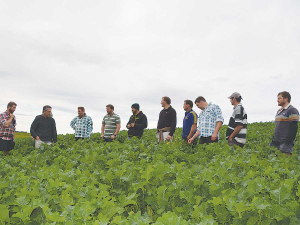The beginning - not end!
After seven years, the Red Meat Profit Partnership (RMPP) came to an end on 31 March, yet chair Malcolm Bailey says it's work is "continuous".
 The Bruce District Action Group is transitioning to a self-funded group now that the Red Meat Profit Partnership has ended. Photo Credit: Joanne Cuttance.
The Bruce District Action Group is transitioning to a self-funded group now that the Red Meat Profit Partnership has ended. Photo Credit: Joanne Cuttance.
The Otago-based Bruce District Action Group is transitioning to a self-funded group now that the Red Meat Profit Partnership (RMPP) has ended.
The group wants to ensure its members can continue to build on the gains they have made. Group facilitator, Abacus Bio farm consultant Simon Glennie, said the seven group members had originally been part of a farmer discussion group, before switching to become and RMPP Action Group with a business focus.
"This group had already been working together so had a lot of confidence and trust," he says.
The group undertook the RMPP Taking Ownership of Your Financials programme with farm accountant Lawrence Field early on.
"That really set us up well to get things going. We also looked at every member's animal health costs, as a group. They all brought all their costs in, right down to the last drench. It required real commitment among members to do that and we went through them across the group, and that worked very well."
The group also made a visit to the ANZ corporate office in Dunedin.
"ANZ had some of their corporate banking team go through commercial property purchasing, the residential property market and what investing on farm looks like," Glennie says.
"These are cornerstone topics and some of our members are looking at investing in residential property as a strategic move. They have well-developed farms and are looking at ways of managing succession without splitting the farm."
Bruce District group member Nigel Woodhead farms 2,600 breeding ewes, 750 hoggests and 60 Friesian bulls on 400ha (320ha effective) at Lovells Flat, near Balclutha.
"The attraction of moving to the action group model was the ability to bring in experts," he says. "That has been great, being able to work with experts in a small group and to ask questions on really detailed stuff that is specific to us and our farm businesses."
Woodhead says the peer-to-peer learning is also huge.
"I'm the second youngest in the group and I've only been farming on my own account for five years and I've studied at Lincoln, but some of the group have 20 or more years' experience running their own farm businesses."
He says that he regularly incorporates learnings taken from the Action Group into his day to day farming.
"I haven't made massive policy changes but I make a lot of little tweaks as a result of what I've learned through the group."
Glennie says the group began discussing transitioning to self-funding at their last meeting.
"They see they are getting good value out of it and are happy to continue funding it. We had already done an exercise around what they put into the group versus what they got out of it and that was very positive."
Budou are being picked now in Bridge Pā, the most intense and exciting time of the year for the Greencollar team – and the harvest of the finest eating grapes is weeks earlier than expected.
The Real Estate Institute of New Zealand (REINZ) has released its latest rural property report, providing a detailed view of New Zealand’s rural real estate market for the 12 months ending December 2025.
Rural retailer Farmlands has released it's latest round of half-year results, labeling it as evidence that its five-year strategy is delivering on financial performance and better value for members.
OPINION: "We are back to where we were a year ago," according to a leading banking analyst in the UK, referring to US president Donald Trump's latest imposition of a global 10% tariff on all exports into the US.
DairyNZ says the Government’s proposed Resource Management Act reform needs further work to ensure it delivers on its intent.
Overseas Trade Minister Todd McClay says he's working constructively with the Labour Party in the hope they will endorse the free trade agreement (FTA) with India when the agreement comes before Parliament for ratification.

OPINION: A mate of yours truly reckons rural Manawatu families are the latest to suffer under what he calls the…
OPINION: If old Winston Peters thinks building trade relations with new nations, such as India, isn't a necessary investment in…